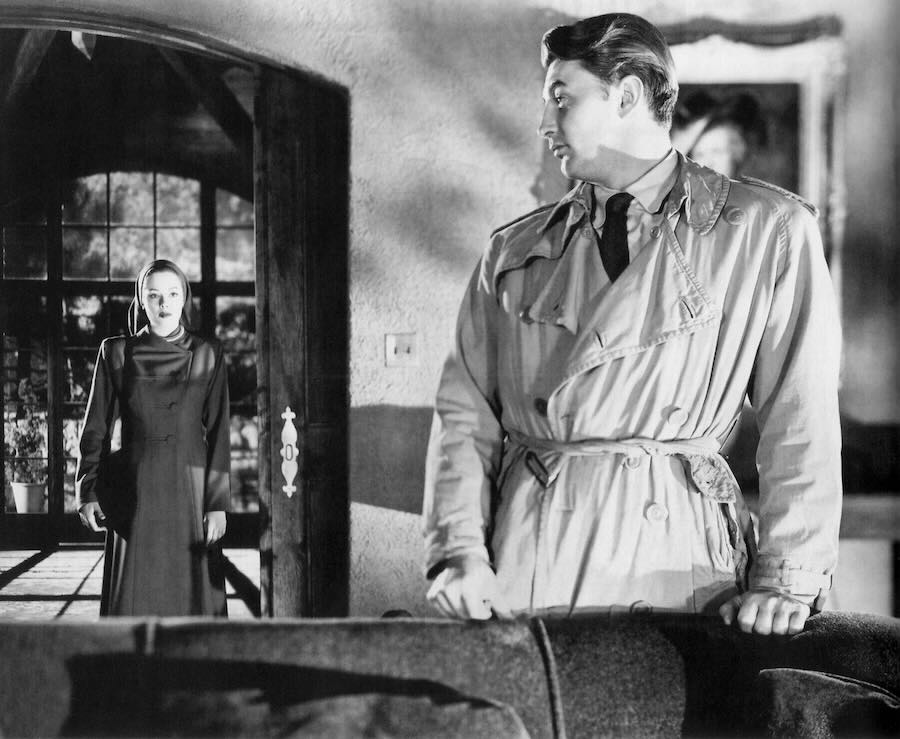Like the most exemplary of his contemporaries in Hollywood’s studio era, the French-born director Jacques Tourneur was remarkably chameleonic, notable for his dexterous play with genre and mood across a formidable body of work. For a viewer that’s well-versed in classic Hollywood, the suggestion of a Tourneurian style likely prompts strong associations with the shadowy, almost minimalistic trio of shoestring budget horror pictures (Cat People, I Walked with a Zombie, The Leopard Man) that Tourneur directed for producer Val Lewton’s unit at RKO in the early 1940s. However, even a quick glance at Tourneur’s extensive career reveals more diverse endeavors: idiosyncratic westerns (Stars in My Crown, Canyon Passage), Technicolor swashbucklers at 20th Century Fox and Warner Bros. (Anne of the Indies, The Flame of the Arrow), and, perhaps most crucially, a slate of crime thrillers that helped shape film noir as a style.
Of Tourneur’s noir excursions, Out of the Past (1947) remains his most known achievement—and one of the most beloved of all noir pictures. This critical appreciation grew over the decades. As the film critic Chris Fujiwara notes in The Cinema of Nightfall, his comprehensive tome on Tourneur, Out of the Past’s producers and actors were mostly indifferent to the film at the time of its release, only for it to later become “the quintessential example of film noir.” Upon first encounter with the film, it’s easy to see why and how it came to define the noir paradigm. The film presents a typically tantalizing premise right from the opening credits, which offer the spectator a backseat view to the arrival of a mysterious stranger in the small mountainside town of Bridgeport, California. The man is Joe Stephanos (Paul Valentine), and he’s here to visit Jeff, played by a youthful Robert Mitchum, early in his RKO days. A gas station owner with an ordinary life and a perfectly pleasant, plain-Jane girlfriend (Virginia Huston), Jeff’s mundanity emerges as a mirage. These conflicts are established with a startling immediacy in the first reel, a reminder of Tourneur’s singular economic approach to narrative and the extraordinary clarity of his visual language.
Jeff is a figure who reverberates throughout film history, a foundational precursor to later noir protagonists like Viggo Mortensen’s Tom Stall in David Cronenberg’s A History of Violence (2005): ordinary men with violent pasts hoping to stay hidden, tucked away in a world where they have reinvented themselves. With Joe’s unexpected arrival, initiated by the influential Whit Sterling (a devilish Kirk Douglas), former PI Jeff is now summoned back into a criminal world that he hoped to leave behind. His exodus was, in quintessential noir fashion, expedited by hopeless attraction to a woman. Tasked with following Kathie Moffat (Jane Greer) into Mexico to recover $40,000 stolen from Whit, Jeff instead fell in love with the cunning femme fatale. “And then I saw her,” Jeff recalls in his narrated flashback, “coming out of the sun… And I knew Whit didn’t care about that forty grand.”
Written by Daniel Mainwaring under the pen name Geoffrey Homes (and based on his own novel, Build the Gallows High), Out of the Past is laden with this kind of delicious hard-boiled dialogue. It drips with barely contained sexuality and, at times, a streak of gleeful viciousness. Though the plot grows more convoluted by necessity, the film’s central attraction is the death spiral romance between Mitchum and Greer, each at the peak of their powers. Their repartee is as hot as the Acapulco sun: a sweltering, sticky amour fou that metastasizes into something uncontrollable and primal. Long before his talents were manipulated to more decisively malevolent ends in films like The Night of the Hunter (1955), Mitchum proved his movie star chops and his subtle versatility here. Jeff is world-weary and whip-smart—this is no pathetic noir patsy—but he also retains a trace of naïveté, that inescapable feeling that he is putty in the hands of broader forces of sex and power that will one day swallow him whole. The complexity of Jeff is reflected in Kathie as well. Fujiwara contends that the “warmth, sensuality, and spontaneity” offered by Greer elevates the character beyond the limitations of the femme fatale; she is a cut above the formula that Out of the Past helped to create.
“You’re no good for anyone but me,” Kathie intones with venomous passion, “you’re no good and neither am I, we deserve each other.” Mitchum and Greer potently evoke this volatile lust: a lust that lingers for a romance long gone and a time long dead, vanquished to memory, so seductively framed by Tourneur that we believe in the possibilities of their renewed romance. “Maybe… luck is like love,” Jeff muses in a short-lived reunion with his hometown sweetheart, “you have to go all the way to find it.” By the conclusion of Out of the Past, Jeff and Kathie have gone all the way, yet their search for love (and for a little bit of luck) remains fruitless, tragically unfulfilled.
Out of the Past screens Saturday, January 25, at the Grand Lake Theater as part of “Noir City.”



